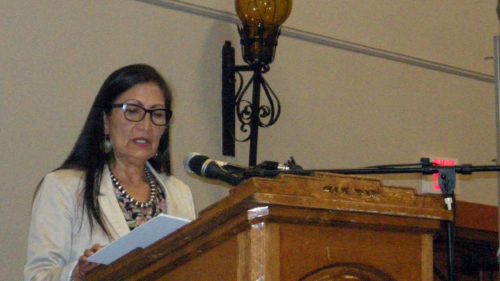SANTA FE — A New Mexico legislative committee adjourned Thursday without taking a vote after hearing hours of often emotional testimony on a bill that would ban recreational and commercial trapping on public lands in the state.
Rep. Matthew McQueen, chairman of the House Energy, Environment and Natural Resources Committee, said the committee plans to vote on Saturday. McQueen, a Santa Fe Democrat, is among the sponsors of the bill, HB366.
Opponents of the bill included Jesse Deubel, executive director of the New Mexico Wildlife Federation.
“The North American Model of Wildlife Conservation allows for trapping as an appropriate and effective tool for the scientific management for our renewable and sustainable wildlife resources,” Deubel testified.
Deubel noted that the New Mexico Department of Game and FIsh employs wildlife biologists. “Please allow our state’s professional wildlife managers to set the rules and regulations as part of their management plan,” he said.
Deubel said that if legislators see any need to pass a law in regard to trapping that they should enact a different bill, Senate Bill 390, sponsored by Sen. Pete Campos, D-Las Vegas. Campos’bill generally would leave it up to the New Mexico Game Commission to regulate trapping on public and private lands.
Shawn Carrell, vice president of the New Mexico Conservation Officers Association, said his group opposes the bill. He said issues facing metropolitan issues such as Albuquerque and Santa Fe don’t affect the issues in places such as Clayton and Roswell.
Joseph Luna of Estancia, president of the New Mexico Trappers Association, urged the committee to reject the bill. Many trappers testified they rely on income from hides and need to trap coyotes and other predators to protect livestock.
“Please, reevaluate this,” Luna said. “You will impact a lot of lives. Not just your constituents in your district, but the entire State of New Mexico.”
Rep. Christine Chandler, D-Los Alamos, is a co-sponsor of the bill. She told the committee that enacting it would ensure humane management of wildlife while offering protection for pets and people.
Chandler said wild animals caught in traps commonly die of dehydration or can be killed by other animals while restrained.
“Some of my constituents have had their dogs caught in traps.” Chandler said, adding the experiences were traumatic for all involved.
Jessica Johnson, chief legislative officer with Animal Protection Voters, testified there been reports from around the state in recent years of pet dogs being caught in snares and of people finding wild animals languishing in traps.
“This bill, I believe, aims to be a balanced measure. It does not apply to private land and does not apply to tribal land,” Johnson said.
Delinda VanneBrightyn, leader of Taos Search and Rescue, said members of her group are ready to deploy at any time, including at night and said they don’t want traps to be a hazard.
“We have our search dogs who do work off lead, who must work off lead, in order to possibly save a life,” VanneBrightyn said. “Leghold traps and snares have been a constant concern of those who are on my team and on other teams in the state.”



